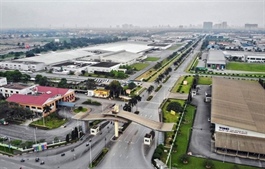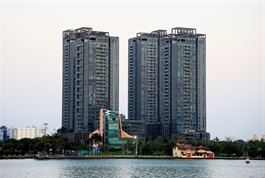Construction and real estate grapple with insolvency
Construction and real estate grapple with insolvency
Although numerous plans have been issued in an attempt to revitalise the real estate market and various related construction schemes, policy complexities persist.

Nguyen Quoc Hiep, president of the Vietnam Association of Construction Contractors (VACC), stated at an expanded executive committee meeting at the beginning of June that the construction sector is “scarcely afloat; even the largest contractors function in moderation, with a severe lack of cash flow”.
According to Hiep, at the conclusion of the first quarter of 2023, approximately 30 per cent of construction companies were forced to close. “There were primarily small- and medium-sized enterprises with less than $1.28 million in capital and less than five years of operating history,” Hiep said.
But the major developers are suffering too. According to its Q1 financial statement, revenues of Hoa Binh Construction Group, one of the largest in Vietnam, plunged by 60 per cent compared to the same period last year, earning only $50.8 million, its lowest figure since the Q3 of 2015.
Construction and real estate grapple with insolvency, photo Le Toan
Other construction groups also suffered a decline in revenue. After the first three months of the year, Hung Thinh Incons endured a financial loss, with a negative after-tax profit of $749,000. During the same period last year, Hung Thinh earned $1.84 million in profit.
Comparatively, Vietnam Construction and Import-Export had a profit after taxes of approximately $809,000 in the first quarter, a decrease of 98 per cent compared to the same period last year.
Elsewhere, Quang Nam People's Court initiated bankruptcy proceedings against Dana HomeLand at the end of May. Dana HomeLand is a property development business in the central region of Quang Nam, Quang Ngai, and Danang. Investors had been waiting several months to prosecute the company for failing to transfer Dien Nam-Dien Ngoc Urban Area projects as promised, according to Quang Nam People’s Committee.
President of the Vietnam Association of Realtors Nguyen Van Dinh told VIR that there are thousands of real estate initiatives across the country that have had to be suspended, with a total investment value of approximately $30 billion.
“Although many documents have been issued, their impact on the market has been minimal. The primary cause is the absence of a standard procedure for the stakeholders to follow. Legal issues have also been raised and tabled numerous times, but no definitive resolution has been reached,” Dinh said.
The crisis level of businesses is depicted in the summary report of the Ministry of Planning and Investment for the first five months of 2023. Over 41,000 construction and real estate companies withdrew from the market, ranking first among industries with the highest number of defunct companies.
Numerous solutions, such as a $5 billion credit support programme or the fostering of public investment, have been proposed to the market in an effort to rectify the situation. However, according to Hiep of VACC, corporations that can invest in the public sector often prioritise technical infrastructure. As a result, only a handful of businesses with adequate equipment, capacity, and experience will be chosen via the contractor appointment mechanism.
Similar to the $5 billion credit programme, not all enterprises are eligible for assistance.
To promote the market, policies such as Resolution No.33/NQ-CP and Decree No.10/2023/ND-CP were enacted earlier this year; however, it is still necessary to be patient with the policy's delay.
“Real estate policy is distinct from financial policy because there is a minimum six-month latency,” said Dr. Tran Ngoc Son of Danang’s Dong A University. “Even six months after these laws are enacted, enterprises may find themselves in difficulties. Therefore, while many businesses may have revamped their products, the legal barriers still exist.”
According to Dinh, however, actual constraints on businesses are being alleviated slowly.
“The real estate market has been exhibiting positive signs as a result of numerous legal documents and a decline in interest rates since May 25. The government has also focused on resolving issues relating to investment processes for group housing projects, such as social housing, worker dwellings, and renovations,” Dinh said.




















